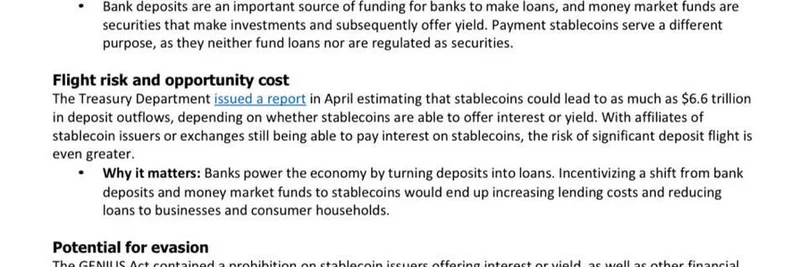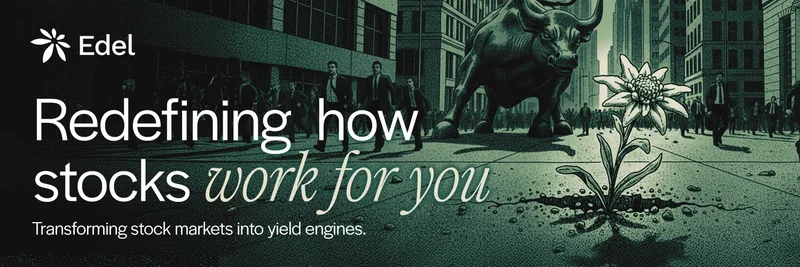In the fast-paced world of cryptocurrency, where meme tokens thrive on quick trades and community hype, stablecoins play a crucial role as the reliable bridge between volatile assets and real-world value. But recent drama unfolding on X (formerly Twitter) shows how traditional banks are scrambling to protect their turf from this innovation. Coinbase CEO Brian Armstrong and Chief Legal Officer Paul Grewal didn't hold back in responding to banking groups' latest push against stablecoins.
The Spark: Cointelegraph's Update on Banking Pressure
It all started with a post from Cointelegraph, highlighting how the Bank Policy Institute (BPI) is urging Congress to "close the GENIUS Act stablecoin interest loophole" to prevent what they call "deposit flight." In simple terms, deposit flight means people moving their money from traditional bank accounts—where interest rates are often pitifully low—to stablecoins that could offer better yields through partnerships.
Stablecoins are digital tokens pegged to stable assets like the US dollar, making them essential for trading meme tokens without the wild price swings of something like Bitcoin. The GENIUS Act, a recent piece of legislation aimed at regulating these stablecoins, already bans issuers from directly paying interest or yield to holders. However, it doesn't explicitly stop affiliates like exchanges or wallets from doing so, creating what banks label a "loophole."
Paul Grewal's Fiery Response
Coinbase's Paul Grewal quote-tweeted Cointelegraph's update, calling out the narrative head-on: "This was no loophole and you know it. 376 Democrats and Republicans in the House and Senate rejected your unrestrained effort to avoid competition. So did one President. It's time to move on."
Grewal's point? This isn't some accidental gap in the law—it's a deliberate choice by lawmakers to foster competition. Banks, he implies, are just trying to cling to their high-profit margins by stifling crypto's growth. With bipartisan support and presidential backing for the current GENIUS Act, Grewal argues it's time for banks to adapt rather than lobby for more restrictions.
Brian Armstrong Weighs In with a Savage Title Suggestion
Not one to stay silent, Coinbase CEO Brian Armstrong then quote-tweeted Grewal with a blunt rephrasing: "More accurate title would have been: 'Government, please block our competition so we can maintain our fat margins.'"
Armstrong's comment cuts to the chase, accusing banks of using regulatory pleas as a shield for their own interests. In the crypto space, where meme tokens like those on Base (Coinbase's layer-2 network) rely on efficient, low-cost stablecoin transactions, such restrictions could slow down innovation and limit yields that benefit everyday users.
Why This Matters for Meme Tokens and Blockchain Practitioners
At first glance, this might seem like a spat between big banks and crypto giants, but it has ripple effects for the meme token community. Stablecoins like USDC (which Coinbase co-issues with Circle) are often used as trading pairs for meme coins on decentralized exchanges. If banks succeed in closing this "loophole," it could mean fewer incentives for holding stablecoins, potentially reducing liquidity in meme markets.
For blockchain practitioners, this highlights the ongoing tension between traditional finance (TradFi) and decentralized finance (DeFi). Banks fear losing deposits because stablecoins can offer yields through reserve investments—something the GENIUS Act allows via intermediaries. As reports from the BPI show, they're worried about systemic risks, but critics like Armstrong see it as anti-competitive behavior.
This debate underscores the need for balanced regulation that protects users without crushing innovation. Meme tokens, born from community-driven hype, thrive in environments where capital flows freely. If yields on stablecoins get curtailed, it might push more activity toward riskier assets or offshore options, complicating things for US-based traders.
The Bigger Picture: Competition Drives Progress
As Grewal noted, overwhelming congressional support for the GENIUS Act as it stands suggests lawmakers want crypto to challenge the status quo. Banks' letters to Congress, co-signed by groups like the American Bankers Association, argue for extending the interest ban to prevent unfair competition. But in the eyes of crypto advocates, that's just code for preserving monopolies.
For meme token enthusiasts and blockchain builders, staying informed on these regulatory battles is key. Tools like stablecoins aren't just about stability—they're about empowering users with better returns and faster transactions. As this story develops, it could shape how meme ecosystems evolve, potentially boosting adoption if crypto wins the day.
What do you think? Is this a genuine loophole or a bid to squash competition? Drop your thoughts in the comments below, and keep an eye on Meme Insider for more updates on how regulation impacts your favorite tokens.




